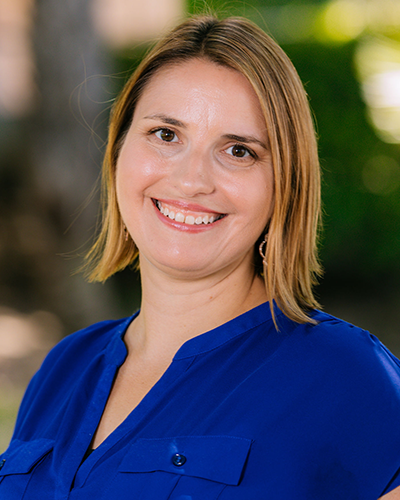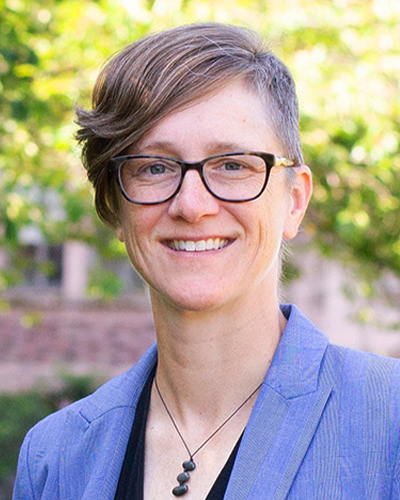Leah Pistorius
February 29, 2024
Human Centered Design & Engineering Professor and Chair Julie Kientz is joining the esteemed ranks of the SIGCHI Academy, and Associate Professor Kate Starbird receives the prestigious 2024 SIGCHI Social Impact Award.
The Special Interest Group on Computer-Human Interaction (SIGCHI), under the Association for Computing Machinery, is an international community dedicated to the research, education, and practical application of human-computer interaction. Each year, SIGCHI acknowledges individuals for their exceptional contributions to research, teaching, practice, and service within this field.

Julie Kientz
HCDE Professor and Chair
SIGCHI Academy
The SIGCHI Academy is a distinguished group of individuals recognized for their significant and cumulative contributions to the advancement of human-computer interaction and their influence on the research of others.
Professor Kientz is a leader in HCI research, education, and service. With students in the Computing for Healthy and Inclusive Living and Learning Lab, she focuses on health, ubiquitous computing, and interaction design and children. Her contributions include childhood development, accessibility, technology to support healthy sleep, design for mental health, and self-tracking and self-experimentation.
As a researcher, Professor Kientz's expertise is highly sought. She is Co-Principal Investigator and UW lead on the AI Institute for Exceptional Education, a cross-institutional partnership to transform education for children with speech and language processing challenges, and is the UW lead on the Connecting the EdTech Research Ecosystem (CERES) Center, a network aimed at reducing growing inequalities in children's learning and development and increasing access to education for children with disabilities. She has also served on the scientific advisory board for the UW Alacrity Center, a National Institute of Mental Health-funded center redesigning mental health interventions, as a leader in the Intel Science & Technology Center on Pervasive Computing, and as a scientific advisor to the Center for Innovation in Sleep Self-Management.
Dr. Kientz works to translate HCI research into practical applications. Drawing from her research on screening and childhood development, she co-chaired Washington State’s Universal Developmental Screening Partnership Focus & Momentum Team, an initiative that led to the state’s Strong Start program, which allows parents, guardians, and health care providers to enter and access screening information in one place. In related work, Kientz is collaborating with Seattle Children’s Hospital and the UW Population Health Initiative’s social entrepreneurship program to make the screening process more culturally responsive in primary care.
Dr. Kientz received her Ph.D. in Computer Science from the Georgia Institute of Technology in 2008, and she holds adjunct appointments in the UW's Information School and Paul G. Allen School of Computer Science & Engineering. Kientz is the first HCDE faculty member to be named to the SIGCHI Academy.

Kate Starbird
HCDE Associate Professor
SIGCHI Social Impact Award
The SIGCHI Societal Impact Award recognizes mid-career or senior individuals who work to address social issues through human-computer interaction.
Professor Starbird's research sits at the intersection of human-computer interaction and the field of crisis informatics, which broadly includes the study of how social media and other information-communication technologies are used during crisis events. Starbird has studied, both qualitatively and quantitatively, the role of technology in various crisis events, including post-earthquake Haiti, the Arab Spring, and the Boston Marathon bombing. Through her analysis of massive amounts of social media “big data” in 2014, she was among the first researchers to identify patterns of misinformation and disinformation online.
Currently, Professor Starbird focuses on understanding the production and spread of online rumors, misinformation, and disinformation during crises and other breaking news events, including elections. In particular, she develops and deploys methods for conducting rapid research to help resolve rumors as they unfold and investigates the participatory nature of disinformation campaigns, exploring both top-down and bottom-up dynamics.
As a co-founder and current director of the UW Center for an Informed Public (CIP), Starbird leads efforts to combat online misinformation and manipulation through research, education, and policy recommendations. She as an exemplary public scholar and engages with media outlets, policymakers, and technology companies to share her latest research. Through the CIP, she works with libraries, holds town hall events, and conducts workshops for journalists to ensure the problems of mis- and disinformation are understood and addressed by all of society.
Dr. Starbird received her PhD in Technology, Media and Society from the University of Colorado in 2012 and holds an adjunct faculty appointment in the UW’s Information School.
Additional UW honorees in the SIGCHI Awards in 2024 include Shwetak Patel, Professor in the Paul G. Allen School of Computer Science & Engineering and the Department of Electrical & Computer Engineering, who was also named to the SIGCHI Academy. The awardees will be formally recognized at the upcoming ACM CHI 2024 conference in May 2024.
For a comprehensive list of the 2024 SIGCHI awardees, view the SIGCHI announcement.